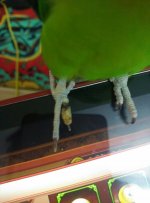PaulC
New member
Hi everyone,
I'm very new here.
I have had my lovebird ''Trevor'' for just over a year now, a few weeks back he got a small fiber wrapped round his toe. Not sure where it came from as he is always well supervised when he is out of his cage. Anyway I took him to the vet and they removed it for him, gave me some cream and spray and said keep an eye on the toe. But since the doctor removed the fiber his toe has only got worse, the doctor said it was pretty deep and that he may end up loosing the toe.
He is due to go back next week, but I am worried if it can wait that long?? It is yellow and black and I am really worried he will loose it, it is hard for him to stand on it and walk but he does not seem any different (personality wise). He still eats a lot and is happy and loves to spend time with my wife and I.
I live in China so it took a lot of searching to find a vet who can deal with birds. And even then I have to travel 4 hours
Thank you so much in advance for any advice given.
Take care.
I'm very new here.
I have had my lovebird ''Trevor'' for just over a year now, a few weeks back he got a small fiber wrapped round his toe. Not sure where it came from as he is always well supervised when he is out of his cage. Anyway I took him to the vet and they removed it for him, gave me some cream and spray and said keep an eye on the toe. But since the doctor removed the fiber his toe has only got worse, the doctor said it was pretty deep and that he may end up loosing the toe.
He is due to go back next week, but I am worried if it can wait that long?? It is yellow and black and I am really worried he will loose it, it is hard for him to stand on it and walk but he does not seem any different (personality wise). He still eats a lot and is happy and loves to spend time with my wife and I.
I live in China so it took a lot of searching to find a vet who can deal with birds. And even then I have to travel 4 hours
Thank you so much in advance for any advice given.
Take care.

